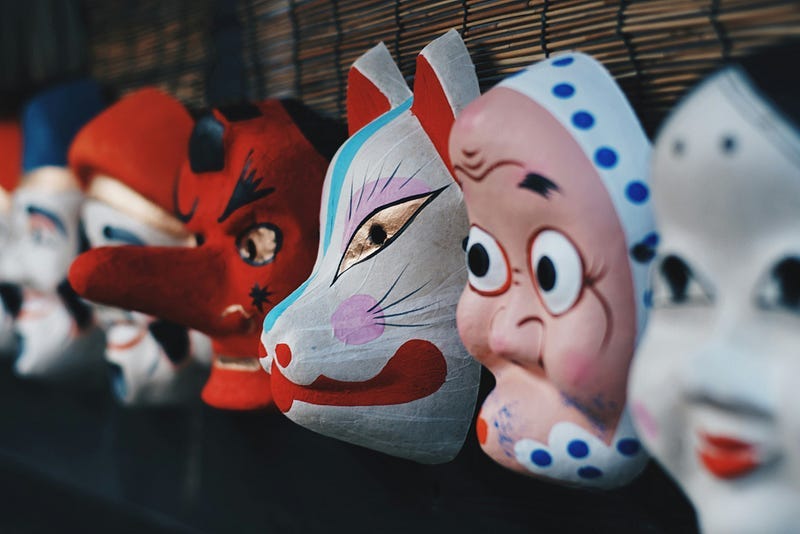Why I Started My Newsletter ‘Japan Uncovered'
I hope to correct the misinformation on the Internet, even if it is like sprinkling water on parched soil

Dear subscribers, thank you for supporting me. Today, I would like to share with you the reason behind starting this newsletter.
Living overseas with my cat, much like Kiki in the Studio Ghibli anime 'Kiki's Delivery Service,' I strive to stay positive by utilising my primary skill, writing.
At the same time, I also have a side like San from 'Princess Mononoke'. Writers are people who harbour anger, frustration, and sadness within themselves (just like everyone else). And we try to sublimate those feelings through our writing.
Today, I will probably show you my 'Princess Mononoke' side. It contains negative feelings, and there are even parts where I directly criticise someone. Only those who don't mind it should continue reading.
Criticism of Japan is flooding the Internet
I started writing English articles in the spring of 2023. I chose Medium as my platform because a lady living in London recommended it to me.
It is an excellent platform, but I also noticed a few strange things. One of them was the large number of articles criticising Japan written by foreigners. While I could understand some of the criticism, I often saw a problem with the writers themselves.
For example, an American wrote, 'The US and Japan have a good relationship, so Americans should be welcomed with open arms. But Japanese people don't treat us with special kindness and don't speak English, which is a big problem.' Is this a joke? Are they unaware of issues surrounding US military bases in Japan? Don't they know Japanese people are not spoken to in Japanese in the US?
This may be an extreme example. However, even some foreigners who have lived in Japan for decades seem to misunderstand Japanese society and feel resentful. They clearly did not do enough research beforehand and jumped into this Far Eastern country without reading the fine print.
To my greater surprise, despite their strong dissatisfaction with Japan, these same people speak about Japanese society and culture as if they were experts. They talk about Japan as if it were their own country, even when they openly admit they don’t speak good Japanese. Some haven’t even lived in Japan. And all too often, the information they share is wrong or too old.
What on earth are they trying to do?
Non-Japanese writers flock to the buzzword 'Japan'
Last summer, I was appointed as a Nominator for Medium. This means that I was recognised as an expert in Asian art and culture and was tasked with finding exceptional articles. As a result, I now read many articles related to Asia on the platform every day. And I have realised that Westerners do not always take the same attitude towards other Asian countries.
It's a strange phenomenon. They don't write about other popular Asian countries, such as South Korea, Singapore, and India, with the same frequency and enthusiasm as they do about Japan.
Since Japanese culture is currently a trend overseas, these foreigners may expect to gain attention and financial benefits by posting about Japan.
In other words, Japan is a good source of cash for them.
Of course, many people simply love Japanese culture and enjoy sharing their experiences. However, the content with prejudices and even hate speech is clearly more eye-catching. Consider which article people are more likely to click on: 'The fun watermelon culture of Japan' or 'Ten reasons I find Japan disgusting.'
I'm not sure if they truly hate Japan or if they're just doing it to increase their click count. I suspect the latter is more likely. If Japan were really as problematic as they describe it, they would have fled back to their home country.
We Japanese are annoyed by the spread of misinformation

While they spread such misinterpretations, prejudices, and misinformation about Japan, since they are not Japanese, they do not suffer any inconvenience. They simply keep shooting others in the foot.
And ultimately, it is we Japanese who are left to bear the pain and clean up the mess.
Since moving to the UK, I have been told many times by foreigners that 'Japan has this problem' or 'You have this custom,' and I have corrected them every time. I found it strange that they kept saying the same thing, so I searched online and found that foreigners were spreading the misinformation.
To make matters worse, I often see other foreigners copying and spreading it. They do not check the Japanese sources before sharing (probably because they cannot read Japanese). It is precisely the same structure as fake news, where if 8 out of 10 people in your bubble say the same thing, you believe it to be true.
White privilege further accelerates the problem
When I clarify misunderstandings about Japan face-to-face with people in the UK, I am usually attending Japan-related events, wearing a kimono, and am acquainted with the people there. So, when I explain, almost 100% of people say, 'So that information on the Internet was wrong. I'm glad I checked with someone like you. Thank you so much.' This may also be because we rarely see obvious prejudice against Asians in London.
However, the situation is very different on the Internet. When I point out their mistakes, more than half of them get upset, or more precisely outraged. They unconditionally believe articles and books written about Japan by foreigners, especially white people, but reject anything said by Japanese people.
Wow.
I simply shared a fact that I believe nearly 100% of Japanese people agree with, and I was called a liar and attacked. A man even said, 'All Japanese people are stupid. Having lived in Japan for decades, I don't know a single Japanese person who understands Japanese culture. They can't even draw a map of Japan. I know way more than you do.' Thank you very much.
Furthermore, they tend to believe in, praise, and support each other, which makes it appear even more 'correct' on the Internet.
James Clavell's ‘Shōgun’ is a classic example of this
The article I wrote two months ago actually indirectly referred to this issue. I was so interested to see how this article would be received.
For some people, it seemed unacceptable that a random Japanese writer would criticise a best-selling Western author. I received several unfounded rebuttals and lost a few subscribers. Meanwhile, some people started a paid subscription after reading it, thanking me for sharing the truth. To my relief, the latter group was larger.
Yes, I know. Shōgun is a work of fiction written 50 years ago for a Western audience, intended for entertainment, not education, so I am not so angry. But as I wrote there, it is essential to remember that a few contemporary American writers are making the same mistake.
Some people infringe on Japanese law and our rights

We can’t stop foreigners from publishing and enjoying content with many errors about Japan. Even when we challenge them, we are most often ignored.
Still, I would like to make it clear that there are people on various platforms, including Substack, who are disregarding Japanese law and the rights of Japanese citizens.
The most common offence is publishing photos of Japanese people without permission. These are not people who happened to be in an image. People in kimonos on the streets, those sleeping on trains, and so on, are often deliberately photographed. This constitutes an infringement of portrait rights in Japan.
There are also many cases of copyright infringement involving Japanese artworks, including manga and anime.
I also see articles that clearly fabricate information or use photos from other countries to describe Japan.
Generally speaking, accounts that discuss Japan without revealing their name, nationality, and photo are highly suspicious, although a small number of foreigners may attempt to disguise themselves as Japanese by using Japanese names. We can spot them immediately, but foreigners may struggle to do so.
If you believe that the rights of Japanese people should be respected, refrain from consuming content created by such individuals. Photos and images used without permission are the most obvious red flags.
French journalist from Le Monde fabricated comments
Even some professional journalists reporting on Japan are not trustworthy. News articles are not fiction like Shōgun, so there is no room for excuses.
I have sent emails requesting corrections to several BBC news articles about Japan. I did not receive a reply, but the corrections were all made, which is good.
A recent notable example is that of French journalist Philippe Pons, who fabricated comments made by Professor Tatsuya Shirahase of Kwansei Gakuin University in a paid article (French) (English) published in Le Monde in March this year.
This became clear when a Japanese media outlet, Courrier Japon, obtained the rights to translate the article into Japanese and published it. Professor Shirahase made it public that he had not been interviewed and had not made such comments. He also pointed out problems with the article's content.
When Courrier Japon contacted Le Monde, Pons admitted to fabricating the professor's comments, and the passage was deleted. However, the article itself remains online, and there appears to be no official apology. Courrier Japon has questioned the credibility of the article and has already deleted it in its entirety (apology statement from Courrier Japon).
You can see how serious an issue the fabrication of comments by journalists is. If a Japanese journalist were to do the same thing, it would likely end their career. Nevertheless, Pons decided he could get away with it. He has a long career and has even published a few books on Japan in French, so this was not the result of a novice writer desperately seeking attention.
Even a media outlet such as Le Monde, which is usually highly trusted, has not checked its articles on Japan. It is also regrettable that the journalist did not make a formal apology, making me wonder if he will do it again, or if he has always done it.
This is such a bad example that I have shared the details, but unfortunately, similar cases are not uncommon.
‘Who is writing this and for what purpose?’
Some of you may have received media literacy education at school. When reading content, it is essential not to take it at face value, but to consider the author's identity and their intentions.
For example, if a foreigner writes about their travel experiences in Japan or recommends their favourite shops, there will, of course, be some bias. Still, it is unlikely that they intend to deceive people or attract attention or money.
However, when you see foreigners talking about things from a broader perspective, such as 'Japanese people are...', 'Japanese culture is...', 'The problem with Japan is...', or 'The Japanese way of thinking is...', or when they mention social issues in Japan, I would like you to stop and think about what they are trying to achieve. If they are vague about their name, nationality, or knowledge and work experience related to the topic, I would like you to question why they are not disclosing this information.
It is best not to pay attention to suspicious people. They will disappear if you ignore them. I don't read content by writers whose names or faces I don't know, and I block people who ignore other people's portrait rights and copyrights.
I am not saying that all Japanese writers are good and trustworthy. However, overall, I see few serious problems.
What about me?
I was born and raised in Japan, where I received my education and have worked for many Japanese companies. I am am experienced professional writer and editor with good knowledge of Japanese art and culture. Writing about these topics is a pleasure for me, and since I only started writing in English two years ago and have not yet decided on a specific topic, it would be a good idea to start with something I have solid knowledge about.
As a Japanese person, I will not shoot myself in the foot by spreading misinformation. I am too deeply connected to Japan and many other Japanese people to be irresponsible. At the same time, as in this article about gambling, I can also view Japanese society critically, but I will not do so just for attention.
Since I live in the UK, I have some understanding of Western values. When it comes to choosing topics, I ask my non-Japanese readers and friends for their opinions and make adjustments accordingly.
And above all else, I am eager to find out:
Are there people who want to hear the voices of Japanese people? How many people are interested in the real Japan, not a fabricated version?
If you are reading this and raise your hand, I will be delighted and grateful. It might make me smile, or more likely, cry.
Dive into the real Japan with me!

I know it takes considerable courage for you to trust me, a foreigner, and to see Japanese culture through my eyes. It can sometimes overturn your preconceptions, and it is natural to feel resistance to that.
But that's the real Japan. There are parts you'll immediately like, and parts you won't. That's what learning about a foreign country is all about. For me, France and the UK are just like that.
I share the perspective of a Japanese person - admittedly biased but genuine - as I do my best to make your experience enjoyable. The knowledge you gain here will give you a deeper understanding when you talk to Japanese people, travel to Japan, or enjoy Japanese novels, artworks, films, and anime.
So, our journey is not shallow or superficial. It is a journey that touches the hearts of the Japanese people. When a poor writer hands you a pair of foggy goggles that only allow you to see the trash floating on the surface, I promise to give you a pair of clear, shiny ones.
And I will guide you, sometimes holding your hand, taking you down to depths of 20 metres, 30 metres. I cannot show you everything in the vast ocean that is Japanese culture. But together, we will witness things you never even knew existed. Together, we will marvel and smile.
That is why I started Japan Uncovered, and why I hope this newsletter will be a success. I have so much to show you about Japan. If you subscribe, leave the rest to me. Just remember to bring your curiosity and an open mind!





Watermelons, every time, for me.
Keep up the good work, Yuri 🫶
I don't know if this is common everywhere, but Americans love to state stuff as fact when they shouldn't. I'm not sure if it is a main character syndrome thing or a form of gaslighting but I find it frustrating. As you pointed out, they are likely to become outraged when receiving actual evidence instead of reassessing their original opinion.